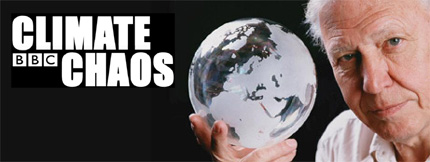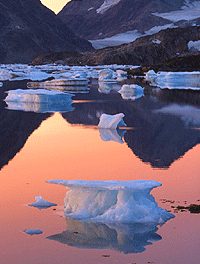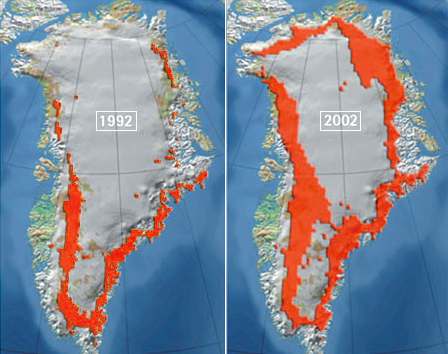|
CLIMATE CHAOS - BBC TV
|
||||||||||||||||||||||||||||||||||||||||||||||||||||||||||||||||||||||||
|
Are We Changing Planet Earth?
Climate Chaos season - Details of all programmes in the BBC Climate Chaos season
Songs of Praise
Test the Nation - Know Your Planet
Can We Save Planet Earth?
Five Disasters Waiting to Happen
The Money Programme
Panorama
David Attenborough's personal journey to discover the state of the planet leads a fortnight of programmes on climate change from the BBC.
REPORTS FROM THE FRONT LINE OF GLOBAL WARMING
Climate change Experiment - Find out how to donate your spare computing power and take part in the world's largest climate change experiment.
Monday, 30 January 2006 - By Richard Black Environment Correspondent, BBC News
Rising concentrations of greenhouse gases may have more serious
impacts than previously believed, a major scientific report has said.
The
report, published by the UK government, says there is only a small
chance of greenhouse gas emissions being kept below
"dangerous" levels. It fears the
Greenland ice sheet is likely to melt, leading sea levels to rise by 7m
(23ft) over 1,000 years. The poorest countries will be most vulnerable
to these effects, it adds.
The
report, Avoiding Dangerous Climate Change, collates evidence presented
by scientists at a conference hosted by the UK Meteorological Office in
February 2005. The conference set two principal objectives: to ask what
level of greenhouse gases in the atmosphere is too much, and what the
options are for avoiding such a level.
In the report's foreword, UK Prime Minister Tony Blair writes that
"it is now plain that the emission of greenhouse gases... is
causing global warming at a rate that is unsustainable."
Environment Secretary Margaret Beckett said the report's conclusions
would be a shock to many people. "The thing that is perhaps not so
familiar to members of the public... is this notion that we could come
to a tipping point where change could be irreversible," she told
BBC Radio 4's Today programme.
"We're
not talking about it happening over five minutes, of course, maybe over
a thousand years, but it's the irreversibility that I think brings it
home to people."
Ice
caps melting Vulnerable
ecosystems
The
report sets out the effects of various levels of temperature increase.
The European Union (EU) has adopted a target of preventing a rise in
global average temperature of more than two degrees Celsius. But that,
according to the report, might be too high, with two degrees perhaps
enough to trigger melting of the Greenland ice sheet. This would have a
major impact on sea levels globally, though it would take up to 1,000
years to see the full predicted rise of 7m. Above two degrees, says the
report, the risks increase "very substantially", with
"potentially large numbers of extinctions" and "major
increases in hunger and water shortage risks... particularly in
developing countries".
'Without
delight'
The
report asked scientists to calculate which greenhouse gas concentrations
in the atmosphere would be enough to cause these "dangerous"
temperature increases.
Currently, the atmosphere contains about 380 parts per million (ppm) of
carbon dioxide, the principal greenhouse gas of concern, compared to
levels before the industrial revolution of about 275ppm. To have a good
chance of achieving the EU's two-degree target, levels should be
stabilised at 450ppm or below, the report concludes.
But,
speaking on Today, the UK government's chief scientific adviser, Sir
David King, said that was unlikely to happen. "We're going to be at
400 ppm in 10 years' time, I predict that without any delight in saying
it," he said. "But no country is going to turn off a power
station which is providing much-desired energy for its population to
tackle this problem - we have to accept that. "To aim for 450 (ppm)
would, I am afraid, seem unfeasible."
But Myles Allen, a lecturer on atmospheric physics at Oxford University,
said assessing a "safe level" of carbon dioxide in the
atmosphere was "a bit like asking a doctor what's a safe number of
cigarettes to smoke per day". "There isn't one, but at the
same time people do smoke and live until they're 90," he told
Today. On the other question asked at the 2005 conference - what are the
options for avoiding dangerous concentrations of greenhouse gases in the
atmosphere? - the report says that technological options to reduce
emissions do exist. It concludes that the biggest obstacles to the take
up of technologies such as renewable sources of energy and "clean
coal" lie in vested interests, cultural barriers to change and
simple lack of awareness.
LINKS:
KEY STORIES
FEATURES
BACKGROUND
Greenland ice sheet melt extent
DESERTIFICATION COP HISTORY
CLIMATE CHANGE COP HISTORY
BIODIVERSITY COP HISTORY
MORE LOCAL AGENDA 21 UK PARLIAMENT A-Z HOUSE OF LORDS A-Z UK COUNCIL'S AGENDA 21
Healthier alternative tastes for adventure capitalists
(330ml and 250ml alu cans 500ml PET bottle)
|
||||||||||||||||||||||||||||||||||||||||||||||||||||||||||||||||||||||||
|
This website is Copyright © 1999 & 2019. The bird logoS and name Solar Navigator are trademarks. All rights reserved. All other trademarks are hereby acknowledged. Max Energy Limited is an educational charity. |
||||||||||||||||||||||||||||||||||||||||||||||||||||||||||||||||||||||||


















